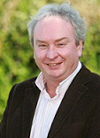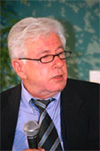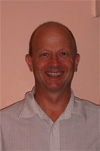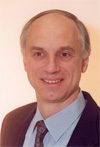|
|
5. Carbon capture and storage (CSS)
| Key note lecture |
 |
John Gale
General Manager, IEA Greenhouse Gas R&D Programme, Cheltenham, UK
E-mail: johng@ieaghg.org
John Gale has been associated with the energy industry for some 30 years. He joined the IEA Greenhouse Gas R&D Programme in 1999 and became General Manager in 2008. Prior to becoming General Manager, John managed the Programmes activities on Non -CO2 greenhouse gases, greenhouse gas abatement in energy intensive industries and geological storage of CO2. He was one of the co-coordinating lead authors on the 2005 IPCC Special Report on CO2 Capture and storage. He is currently Editor-in -Chief of the International Journal on Greenhouse Gas Control. |
| Theme 1: CO2 capture technology |
 |
Philippe Matthieu
University Liège – BE
E-mail: pmathieu@ulg.ac.be
He got a degree of Ingénieur Civil Physicien at the University of Liège in 1968 and became Doctor in Applied Sciences.
He is currently lecturing on power generation in all its forms : fossil fuels fired power plants, nuclear power plants and renewable energies.
His research activities cover a broad range of technologies aimed at reducing CO2 emissions.
With a Russian colleague (E. Yantoski), he designed and developed a novel zero emission gas turbine cycle, known as the Matiant cycle in the literature, in the mid-nineties. He played a role of pioneer in the field of low emission power generation since then.
At the national level, he was a member of the Federal Belgian AMPERE commission (Analysis of the Modes of Production of Electricity and Restructuring of Energies). He is member of the Editorial Board of 3 international journals.
At the international level, he took part to large European projects on CO2 capture and storage and belongs to the Advisory Committee of two of them.
He contributed to the special report on CO2 capture and storage published in 2005 by the IPCC. For this work, he was co-laureate as an expert of the IPCC of the 2007 Nobel Peace Prize , together with Al Gore. |
| Theme 2: CO2 geological sequestration |
 |
Sam Holloway
British Geological Survey – GB
E-mail: shol@bgs.ac.uk
Sam Holloway has worked on CCS for the British Geological Survey since 1990.
From 1992 - 1996, he was Co-ordinator of the Joule 2 project 'The Underground Disposal of Carbon Dioxide' and since then he has worked on several major EU-funded carbon sequestration projects, including the monitoring of the storage of carbon dioxide at the Sleipner West gas field.
He is an author of the IPCC Special Report on Carbon Dioxide Capture and Storage, and the CCS part of the IPCC guidelines for compiling national greenhouse gas inventories. |
| Theme 3: Mineral carbonation and the industrial utilization of CO2 |
 |
Klaus Lackner
Colombia University, Lenfest Center for Sustainable Energy
E-mail: klaus.lackner@columbia.edu
Klaus S. Lackner, Ph.D. 1.22.2009 Biography Klaus S. Lackner joined the faculty of Columbia University in 2001, where he is the Ewing-Worzel Professor of Geophysics in the Department of Earth and Environmental Engineering, and a member of the Earth Institute.
He is the Director of the Lenfest Center for Sustainable Energy and the Chair of the Department of Earth and Environmental Engineering in the School of Engineering and Applied Sciences.
Klaus Lackner received his Ph.D. in 1978 in theoretical physics from the University of Heidelberg, and held postdoctoral positions at the California Institute of Technology and the Stanford Linear Accelerator Center before joining Los Alamos National Laboratory in 1983.
At Los Alamos National Laboratory, Lackner became involved in hydrodynamic work and fusion-related research. His interest in self-replicating machine systems has been recognized by Discover Magazine as one of seven ideas that could change the world.
Currently he is developing innovative approaches to energy issues of the future. He has been instrumental in forming the Zero Emission Coal Alliance, an industry led group that defined the zero emission concept.
His recent work is on environmentally acceptable technologies for the use of fossil fuels. Research topics focus on carbon management, specifically the capture of carbon dioxide in power plants, and also directly from the atmosphere.
Research at Columbia University is focused on mineral sequestration, zero emission coal plants, carbon electrochemistry and the study of large scale energy infrastructures. |
| Theme 4: Legal and regulatory issues |
 |
Brendan Beck
IEA/SPT/ETP
Brendan is an Energy Analyst at the International Energy Agency (IEA) in Paris where he works on CO2 capture and storage (CCS). Amongst his responsibilities are the management of the IEA CCS Regulators Network and of the IEA CCS Roundtable initiative, including the most recent Roundtables in Brazil, South Africa and Indonesia. Prior to joining the IEA, Brendan worked for the IEA Greenhouse Gas R&D Programme where he focussed on the legal and regulatory aspects of CCS as well as technical aspects of CO2 storage and monitoring. Since completing his Bachelor of Engineering with Honours at the Australian National University, Brendan has worked on CCS at the World Coal Institute in London and the Co-operative Research Centre for Greenhouse Gas Technologies (CO2CRC) in Australia.
|
|






